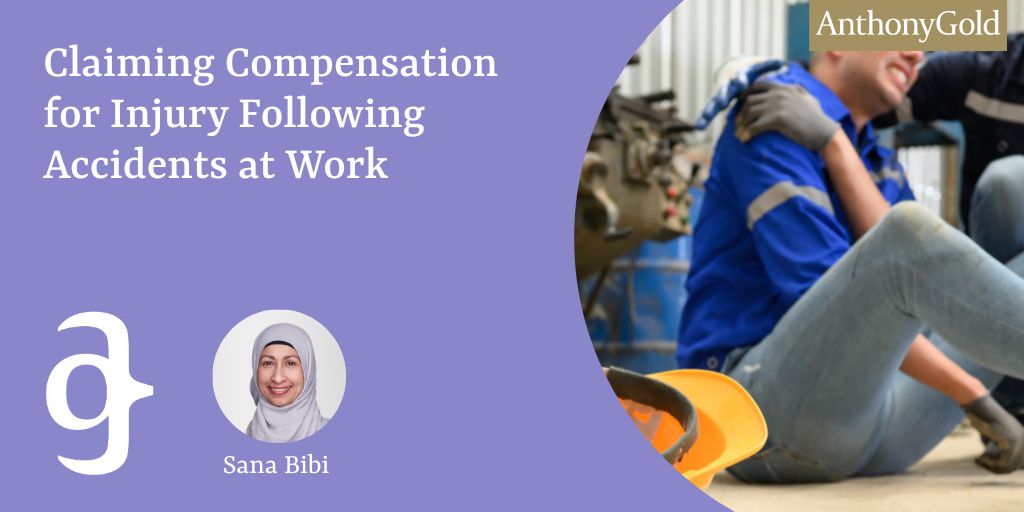Claiming compensation for injury following accidents at work


My colleagues and I are often instructed to deal with claims on behalf clients who have been injured at work. A split-second act or omission would usually lead to life changing injuries, affecting them and their family lives forever. With support and early rehabilitation, some clients do regain a reasonable quality of life, but not the same ‘old life’ that was pre-accident.
It is really inspiring to see that despite the enormous challenges faced, how some of our clients courageously re-build their lives. I recently settled a claim for once such client who was injured in an accident at work. He was operating a forklift truck and unloading a delivery from a lorry when he was knocked unconscious by the load which fell off a loose pallet. As a consequence, my client suffered severe bilateral leg injuries for which he required three surgical procedures within two operations including insertion of a nail to their tibia and fibula in the first instance.
My client was in his mid-20s, had recently started working for the defendant company and it was at the height of the pandemic. He was in hospital for almost two weeks but could not be supported by his family as much as they would have liked as they could not visit him in hospital due to the Covid restrictions. When he was discharged home, he was more or less bedbound. He received due care on the NHS whilst an inpatient but that became challenging post his discharge and more so due to the pandemic. I arranged an immediate needs assessment as soon as I could, though this had to be undertaken remotely, again due to the pandemic.
Primary liability was admitted though contributory negligence was alleged. My client had no recollection of the accident, but on the evidence available he was potentially at risk of a reduction for contribution. This was taken into consideration when attempting settlement.
My client could not return to work due to the severity of his injuries. His fractures failed to unite and further surgeries were required. Until recently he had not been able to consider any return to work. Fortunately, after an initial rocky start to the claim, I was able to obtain interim payments to ease my client’s financial difficulties and to fund private surgery and rehabilitation, including neuropsychology, hydrotherapy, and physiotherapy as well as support from a case manager, an OT and a vocational rehabilitation expert. With funding for rehabilitation and case management support, my client’s physical and psychological conditions improved.
Eventually, we were able to settle the claim for well over half a million pounds with which my client was very happy. He was determined not to let his limitations affect his future, had made plans to return to part time work and look after his family which gave him a sense of purpose. There was a time, as often is the case that he felt a failure as a husband and father. At one stage his marriage was on the brink of a collapse.
Most, if not all, workplaces have employers’ liability and or public liability insurance which meet claims if negligence against the employer or a colleague can be established. It is important that those who have been injured at work seek legal advice to ensure they recover what they are legally entitled to for their injury and losses.
Please note
The information on the Anthony Gold website is for general information only and reflects the position at the date of publication. It does not constitute legal advice and should not be treated as such. It is provided without any representations or warranties, expressed or implied.
Related Insights
- October 25, 2017
£100,000 compensation for serious pelvis injury
- July 9, 2019
£150,000 agreed for mechanic with fractured collar bone
- July 15, 2020
£3.7 million settlement for young woman in serious road traffic accident
- March 10, 2020
£3.2 million settlement for leg amputation
- May 7, 2019
Brain injury and the importance of rehabilitation
- May 29, 2024
A guide to claims after a serious accident at work
- May 11, 2020
£1m settlement for seriously injured claimant
- April 20, 2017
Accidents at work: the role of the Health and Safety Executive
Our Latest Injury & Medical Claims Insights
- February 13, 2026
Contributory negligence in clinical negligence – A recent case
- February 13, 2026
The difficulty of brief medical records and AI
- December 11, 2025
How to obtain interim payments in personal injury and medical negligence claims
- December 11, 2025
£500,000 settlement for injured jogger after serious road accident
- December 11, 2025
The value of interim payments in personal injury and medical negligence claims
- October 6, 2025
Jess’s Rule – a welcome reminder to reconsider persistent symptoms
Latest Articles
View allInsights: February 20, 2026
Guides: February 16, 2026
Insights: February 13, 2026
Make a payment
Contact the Conveyancing team today
Contact us today
"*" indicates required fields
Contact the commercial
& civil Dispute team today
"*" indicates required fields
Contact the Conveyancing team today
Contact the Conveyancing team today
Contact the Wills, Trusts
& Estates team today
Contact the Court of
Protection team today
Contact the Employment Law team today
Contact the Clinical Negligence team today
Contact the Family & Relationships team today
Contact the Personal Injury Claims team today
Contact the leasehold & Freehold team today
Contact the Corporate & Commercial team today
Contact the housing & disputes team
"*" indicates required fields

































